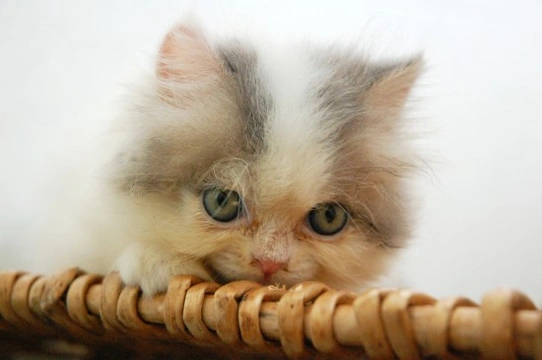
How to Take Care of Tear Stains in Cats
Sometimes our feline friends can develop tear stains which on a white or lighter coated cat can be unsightly and if left to crust over, it can be quite smelly too. A few breeds are more susceptible to the problem than others and if your feline friend continuously has sticky goo around their eyes, knowing how to clean them safely without hurting your pet is essential.
When cats produce a great amount of tears it's a condition known as epiphora and it's when tears fail to drain correctly with the result being they overflow typically in the corner of the eye. Some of cats are born with this particular defect, whereas other cats acquire the condition through injury which can be through injury or fighting with other cats.
Other causes could be due to damaged caused when cats suffer a chronic eye infection. Where breeds are concerned, it could be due to the shape of their faces with the following breeds often being affected by the condition:
- Persians
- Himalayans
- Shorthair Exotics
However, as previously mentioned any cat can develop the condition it's just that a few breeds with flatter faces are more prone to suffering from epiphora than cats with longer faces.
Knowing the Difference Between an Infection
If your cat has sore, red eyes with any sort of yellowish-green discharge in the inner corner of their eye, they are probably suffering from some sort of eye infection and not epiphora. Often if a cat has an ingrowing eyelash, this too can make their eyes weepy.
Another reason why a cat might have an excessive amount of discharge from one or both eyes could be they are suffering from an upper respiratory infection which is commonly seen in cats with the Herpes virus. Before cleaning your pet's eyes, it's really important to discuss your concerns with the vet who might recommend taking your cat along for a thorough examination.
Blockages Can be Flushed
Cats can sometimes suffer a blockage which a vet would be able to flush out. However, if a vet finds the cause is due to scar tissue, they would not be able to clear out the tear duct by flushing it and would recommend another more effective treatment.
Young Cats & Kittens
Very often when young cats are teething you'll find they develop tear stains in the corner of their inner eyes. If this is the case, you can safely wipe the staining away being careful to use a product that's been recommended by your vet. However, if the problem continues even when they have finished teething, it could be worth discussing the problem with your vet.
Is Your Cat Having an Allergic Reaction?
Some cat foods contain certain dyes which often cause an allergic reaction in our feline friends. It is always safer to buy cat food that doesn't contain any artificial colouring and to choose one that doesn't contain any grains like wheat or gluten which are often used as fillers. These can cause an allergic reaction in your cat and as a result increase the volume of tears they produce.
A Reaction to Minerals in Tap Water
Some cats are known to have an allergic reaction to the minerals found in tap water which could also be an allergy trigger. It is best to avoid using plastic water or feed bowl and instead use either ceramic or stainless steel bowls. However, any bowls have to be correctly glazed because if they are not, sometimes they contain lead which is extremely toxic to all living things including cats.
Products Must be Specifically Formulated for Use on Cats
If you are unsure of what to use to clean away tear stains on your cat's face, it's best to ask your vet who would be more than happy to either recommend or prescribe a product. However, there are some very good and safe to use products you can pick up at a reputable pet shop and if you always choose a well known brand, you know they are safe to use on cats.
You have to be careful when cleaning your cat's eyes, making sure you use lint free wipes so that nothing gets in their eyes which apart from making life very uncomfortable for you cat could cause further irritation and make the tear stain issue even worse.
Conclusion
There are quite a few breeds prone to tear staining with flatter faced cats being at the top of the list. However, it's important to recognise the difference between a cat that's suffering from epiphora and one that's got the beginnings of an eye infection. If you are at all unsure, it's best to take your cat to the vet for a thorough check-up so they can establish the root cause. You should always use a product that's been specifically formulated for use on cats to clean their eyes and again, if you need advice ask your vet to recommend one for you or you could do more damage than good.



